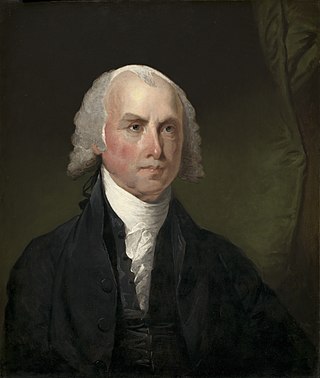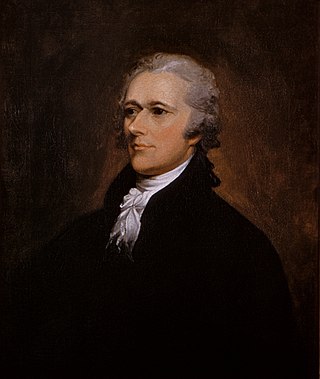
The Federalist Papers is a collection of 85 articles and essays written by Alexander Hamilton, James Madison, and John Jay under the collective pseudonym "Publius" to promote the ratification of the Constitution of the United States. The collection was commonly known as The Federalist until the name The Federalist Papers emerged in the 20th century.

Federalist No. 23 is an essay by Alexander Hamilton, the twenty-third of The Federalist Papers. It was first published by The New York Packet on December 18, 1787 under the pseudonym Publius, the name under which all The Federalist papers were published. One of the more significant essays in the series, No. 23 attempts to justify the increased strength of the federal government under the proposed United States Constitution, compared to the then-active Articles of Confederation. The paper is entitled "The Necessity of a Government as Energetic as the One Proposed to the Preservation of the Union".

Federalist No. 1 is an essay by Alexander Hamilton, which became the first of a collection of essays named The Federalist Papers. It was published on October 27, 1787, under the pseudonym Publius. This paper provides the outline for the rest and arguments for the inadequacy of the Articles of Confederation.

Federalist No. 12 is an essay by Alexander Hamilton, the twelfth of The Federalist Papers. It was first published in The New York Packet on November 27, 1787 under the pseudonym Publius, the name under which all The Federalist papers were published. It is titled "The Utility of the Union In Respect to Revenue".

Federalist No. 14 is an essay by James Madison titled "Objections to the Proposed Constitution From Extent of Territory Answered". This essay is the fourteenth of The Federalist Papers. It was first published in The New York Packet on November 30, 1787 under the pseudonym Publius, the name under which all The Federalist papers were published. It addresses a major objection of the Anti-Federalists to the proposed United States Constitution: that the sheer size of the United States would make it impossible to govern justly as a single country. Madison touched on this issue in Federalist No. 10 and returns to it in this essay.

Federalist No. 15 is an essay by Alexander Hamilton, the fifteenth of The Federalist Papers. It was published by The Independent Journal on December 1, 1787, under the pseudonym Publius, the name under which all The Federalist papers were published at the time. No. 15 addresses the failures of the Articles of Confederation to satisfactorily govern the United States; it is the first of six essays on this topic. It is titled "The Insufficiency of the Present Confederation to Preserve the Union".

Federalist No. 16, titled "The Same Subject Continued: The Insufficiency of the Present Confederation to Preserve the Union", is an essay by Alexander Hamilton. It is one of the eighty-five articles collected in the document The Federalist Papers. The entire collection of papers was written by Alexander Hamilton, James Madison, and John Jay. Federalist Paper No. 16 was first published on December 4, 1787 by The New York Packet under the pseudonym Publius. According to James Madison, "the immediate object of them was to vindicate and recommend the new Constitution to the State of [New York] whose ratification of the instrument, was doubtful, as well as important". In addition, the articles were written and addressed "To the People of New York".

Federalist No. 21, written by Alexander Hamilton, highlights the defects in the Articles of Confederation. It was first published by The Independent Journal on December 12, 1787 under the pseudonym Publius, the name under which all The Federalist papers were published. It is titled "Other Defects of the Present Confederation", and explains how the Articles of Confederation failed in 3 ways: by not giving the government enough power to enforce its laws, that the states do not have a guarantee of their rights, and how the states can simply ignore the tax quotas set by the government.

Federalist No. 26, titled "The Idea of Restraining the Legislative Authority in Regard to the Common Defense Considered", is an essay written by Alexander Hamilton as the twenty-sixth of The Federalist Papers. It was published on December 22, 1787, under the pseudonym Publius, the name under which all The Federalist papers were published. Federalist No. 26 expands upon the arguments of a federal military Hamilton made in No. 24 and No. 25, and it is directly continued in No. 27 and No. 28.

Federalist No. 27, titled "The Same Subject Continued: The Idea of Restraining the Legislative Authority in Regard to the Common Defense Considered", is an essay by Alexander Hamilton, the twenty-seventh of The Federalist Papers. It was published on December 25, 1787, under the pseudonym Publius, the name under which all The Federalist papers were published. Federalist No. 27 is the second of three successive essays covering the relationship between legislative authority and military force, preceded by Federalist No. 26, and succeeded by Federalist No. 28.

Federalist No. 28, titled "The Same Subject Continued: The Idea of Restraining the Legislative Authority in Regard to the Common Defense Considered", is a political essay by Alexander Hamilton and the twenty-eighth of The Federalist Papers. The essay was published on December 28, 1787, under the pseudonym Publius, the name under which all The Federalist Papers were published. This is the last of the three essays discussing the powers of the federal government over a standing military, directly following Federalist No. 26 and Federalist No. 27. Its theme of defense would be continued for one more essay in Federalist No. 29.

Federalist No. 31 is an essay by Alexander Hamilton, the thirty-first of The Federalist Papers. It was first published in The New York Packet on January 1, 1788, under the pseudonym Publius, the name under which all The Federalist papers were published. This is the second of seven essays by Hamilton on the controversial issue of taxation. It is titled "The Same Subject Continued: Concerning the General Power of Taxation".

Federalist No. 33, written by Alexander Hamilton and first published in The Independent Journal on January 2, 1788, continues the focus on the issues in creating an efficient taxation system, along with reassuring the people's doubts about the government control over taxation. Titled "The Same Subject Continued: Concerning the General Power of Taxation", No. 33 explores the idea of allowing Congress to make all laws that are necessary for efficiently operating the national government. Under the pseudonym, Publius, John Jay, Hamilton, and James Madison collectively wrote and published eighty-five essays in the New York newspaper between 1787 and 1788 to promote the ratification of the United States Constitution.

Federalist No. 35 is an essay by Alexander Hamilton, the thirty-fifth of The Federalist Papers. It was first published in The Independent Journal on January 5, 1788 under the pseudonym Publius, the name under which all The Federalist papers were published. This is the sixth of seven essays by Hamilton on the controversial issue of taxation. It is titled "The Same Subject Continued: Concerning the General Power of Taxation".

Federalist No. 34 is an essay by Alexander Hamilton, the thirty-fourth of The Federalist Papers. It was published on January 5, 1788 under the pseudonym Publius, the name under which all The Federalist papers were published. This is the fifth of seven essays by Hamilton on the then-controversial issue of taxation. It is titled "The Same Subject Continued: Concerning the General Power of Taxation".

Federalist No. 36 is an essay by Alexander Hamilton, the thirty-sixth of The Federalist Papers. It was first published in the New York Packet on January 8, 1788, under the pseudonym Publius, the name under which all The Federalist papers were published. This is the last of seven essays by Hamilton on the then-controversial issue of taxation. It is titled "The Same Subject Continued: Concerning the General Power of Taxation".

Federalist No. 41, titled "General View of the Powers Conferred by the Constitution", is an essay written by James Madison as the forty-first of The Federalist Papers. These essays were published by Alexander Hamilton, with John Jay and James Madison serving as co-authors, under the pseudonym "Publius." No. 41 was first published by The New York Packet on January 19, 1788 and argues about the necessity of the powers the Constitution vested upon the general government as well as the meaning of the phrase "general welfare".

Federalist No. 66 is an essay by Alexander Hamilton, the sixty-sixth of The Federalist Papers. It was published on March 8, 1788, under the pseudonym Publius, the name under which all The Federalist papers were published. The title is "Objections to the Power of the Senate To Set as a Court for Impeachments Further Considered".

Federalist No. 81 is an essay by Alexander Hamilton, the eighty-first of The Federalist Papers. It was published on June 25 and 28, 1788 under the pseudonym Publius, the name under which all The Federalist papers were published. The title is "The Judiciary Continued, and the Distribution of the Judicial Authority", and it is the fourth in a series of six essays discussing the powers and limitations of the Judicial branch.
The Taxing and Spending Clause, Article I, Section 8, Clause 1 of the United States Constitution, grants the federal government of the United States its power of taxation. While authorizing Congress to levy taxes, this clause permits the levying of taxes for two purposes only: to pay the debts of the United States, and to provide for the common defense and general welfare of the United States. Taken together, these purposes have traditionally been held to imply and to constitute the federal government's taxing and spending power.




